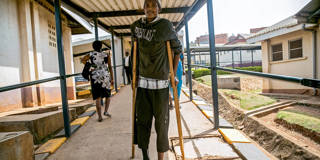While significant progress has been made in halting the spread of communicable diseases in Africa, rates of non-communicable illnesses, especially cancers, are rising. With just 5% of global funding for cancer prevention spent in Africa, a new global strategy is needed to help manage a looming health crisis.
CHICAGO – One of the most pressing public-health challenges in Africa today is also one of the least reported: cancer, a leading cause of death worldwide. Every year, some 650,000 Africans are diagnosed with cancer, and more than a half-million die from the disease. Within the next five years, there could be more than one million cancer deaths annually in Africa, a surge in mortality that would make cancer one of the continent’s top killers.
Throughout Sub-Saharan Africa, tremendous progress has been made in combating deadly infectious diseases. In recent decades, international and local cooperation have reduced Africa’s malaria deaths by 60% , pushed polio to the brink of eradication, and extended the lives of millions of Africans infected with HIV/AIDS.
Unfortunately, similar gains have not been made in the fight against non-communicable diseases (NCDs), including cancer. Today, cancer kills more people in developing countries than AIDS, malaria, and tuberculosis combined. But, with Africa receiving only 5% of global funding for cancer prevention and control, the disease is outpacing efforts to contain it. Just as the world united to help Africa beat infectious disease outbreaks, a similar collaborative approach is needed to halt the cancer crisis.

CHICAGO – One of the most pressing public-health challenges in Africa today is also one of the least reported: cancer, a leading cause of death worldwide. Every year, some 650,000 Africans are diagnosed with cancer, and more than a half-million die from the disease. Within the next five years, there could be more than one million cancer deaths annually in Africa, a surge in mortality that would make cancer one of the continent’s top killers.
Throughout Sub-Saharan Africa, tremendous progress has been made in combating deadly infectious diseases. In recent decades, international and local cooperation have reduced Africa’s malaria deaths by 60% , pushed polio to the brink of eradication, and extended the lives of millions of Africans infected with HIV/AIDS.
Unfortunately, similar gains have not been made in the fight against non-communicable diseases (NCDs), including cancer. Today, cancer kills more people in developing countries than AIDS, malaria, and tuberculosis combined. But, with Africa receiving only 5% of global funding for cancer prevention and control, the disease is outpacing efforts to contain it. Just as the world united to help Africa beat infectious disease outbreaks, a similar collaborative approach is needed to halt the cancer crisis.